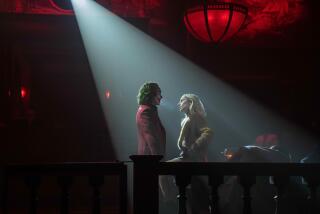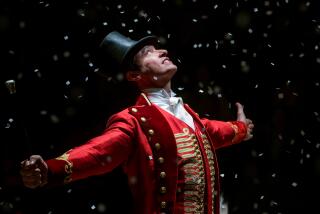An Enchanting Reworking of ‘Fantasticks’
“The Fantasticks,” the beguiling musical in which reality collides with romance, has become America’s longest-running theatrical production, an off-Broadway stalwart for more than four decades. Half a decade ago, director Michael Ritchie completed a film, but it lingered on the shelf until Francis Ford Coppola stepped in to oversee some crucial cutting.
The delay was worth it, because the result is pure enchantment that emerges as an inspired transposition of a musical to the screen--one that manages to honor the theatricality of the source yet becomes a fully cinematic experience.
It’s always a tricky business to flesh out that which so successfully has left so much to the imagination. On stage, “The Fantasticks,” in which a dreamy young woman falls under the spell of a bandit, is performed with minimal props and settings. However, Ritchie had the splendid notion of setting the story in the U.S. heartland of the 1920s. This choice pays off handsomely in several ways.
It is a time and place in which the innocence of the heroine and her boy-next-door beau are wholly credible.
It also invokes a grand theme of silent movies: the city and its denizens as a dangerous temptation to naively virtuous rurals. Thus, “The Fantasticks” in this aspect recalls F.W. Murnau’s “Sunrise” and a slew of D.W. Griffith films and keys the film’s visual grandeur, made possible by those endless stretches of wheat fields.
Indeed, it is in the midst of a seeming nowhere that a colorful traveling carnival pitches its tent in the film’s opening scene. It’s a striking image, at once preserving the play’s intense theatricality as it unfolds against shifting, sweeping panoramas possible only on a big screen--and shot in rich Panavision to boot. In one stroke, the camera’s capacity for creating an aura of realism and the human capacity for conjuring up delirious romantic fantasy, provoked by the carnival performer’s practiced artifices, are boldly contrasted.
Luisa (Jean Louisa Kelly) is a lovely young woman living in a neat-as-a-pin farmhouse with her devoted widower father, Bellomy (Joel Grey), separated by a fence from their next-door neighbors, Hucklebee (Brad Sullivan), who lives in a ramshackle farmhouse with his son Matt (Joe McIntyre). The fathers, it turns out, have conspired to stage a mock feud between them, thus guaranteeing that in defiance, the young people will swiftly bond.
As the carnival sets up for business, Luisa is drawn to the dashing El Gallo (Jonathon Morris), portrayed here as a traveling magician, who casts a spell of grand romance upon the couple. When humdrum everyday existence returns, Luisa and Matt experience such a letdown that she all but throws herself at El Gallo.
As mesmerizing as all this is for us--a pleasure that embraces a clutch of evocative and unforgettable Tom Jones-Harvey Schmidt songs, including such standards as “Try to Remember” and “Soon It’s Gonna Rain”--”The Fantasticks,” for all its seductive strategies, takes some getting used to. That’s simply because we’ve grown so unused to the unique suspension of disbelief required of classic musicals--i.e., the phenomenon of someone breaking into song and dance with the seeming spontaneity of merely walking and talking. In a few minutes, however, we begin to feel the joy of the stylish and venturesome Arthur Freed-produced musicals from the MGM of an earlier era.
Indeed, Kelly and McIntyre remind you of the effortless charm and skill of Jane Powell and Howard Keel. Veterans Grey and Sullivan draw upon those finely polished musical comedy skills--the perfect comic timing, the flawlessly executed moves, the easy shifts from the comic to the serious--that have all but vanished from the screen. Morris is as devilishly handsome as Errol Flynn, but El Gallo’s mission is ultimately not to seduce but to enlighten Luisa, and there’s further robust comic support from Barnard Hughes as the carnival’s brave but forgetful old Shakespearean ham and his mute sidekick, appropriately played by Teller, of Penn and Teller.
*
“The Fantasticks” is a film in which settings and costumes play a major part in creating a unique world. Production designer Douglas W. Schmidt and his crew and costume designer Luke Reichle give us a rural 1920s as yet untouched by flapper clothes and Art Deco design, and a carnival that preserves its florid 19th century P.T. Barnum colors and baroque styling. They succeed flawlessly, with Fred Murphy’s gloriously rich and fluid camera work capturing it all and expressing Ritchie’s perceptive vision of what “The Fantasticks” could be on the screen.
Starting with “Downhill Racer” and “The Candidate” and on through the seriously underappreciated “Smile” and continuing on through “The Positively True Adventures of the Alleged Texas Cheerleader-Murdering Mom,” Ritchie continues in “The Fantasticks” to discover--sometimes satirizing, other times celebrating--the uniquely American experience.
“The Fantasticks” is a gem, but so virtually extinct is the screen musical that the looming question remains as to whether people will care. It’s one thing to pack Manhattan’s small Sullivan Street Playhouse with “The Fantasticks” decade after decade, and quite another to pull crowds with gossamer, lyrical make-believe to the country’s multiplexes.
* MPAA rating: PG, for some bawdy carnival humor. Times guidelines: suitable for all ages.
‘The Fantasticks’
Jean Louisa Kelly: Luisa
Joe McIntyre: Matt
Jonathon Morris: El Gallo
Joel Grey: Bellomy
Brad Sullivan: Hucklebee
An MGM release of a United Artists Pictures presentation. Director Michael Ritchie. Producers Ritchie, Linne Radmin. Executive producer Art Schaefer. Screenplay, lyrics and music by Tom Jones & Harvey Schmidt, based on the stage musical by Jones & Schmidt. Music arranged and adapted by Jonathan Tunick. Cinematographer Fred Murphy. Editor William Scharf. Additional editing by Melissa Kent for American Zoetrope. Costumes Luke Reichle. Production designer Douglas W. Schmidt. Art director Edward L. Rubin. Set decorator Alan Hicks. Running time: 1 hour, 30 minutes.
Exclusively at the AMC Century 14, 10250 Santa Monica Blvd., Century City Shopping Center, (310) 553-8900.
More to Read
The biggest entertainment stories
Get our big stories about Hollywood, film, television, music, arts, culture and more right in your inbox as soon as they publish.
You may occasionally receive promotional content from the Los Angeles Times.










